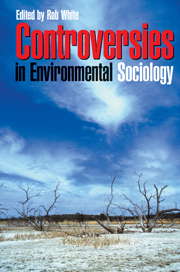Book contents
- Frontmatter
- Contents
- Tables and Figures
- Author Notes
- Abbreviations
- Introduction: Sociology, Society and the Environment
- PART I SOCIAL PERSPECTIVES
- 1 Old Traditions and New Ages: Religions and Environments
- 2 Social Nature
- 3 Gender, Eco-Feminism and the Environment
- 4 Animals, ‘Nature’ and Human Interests
- 5 Governing Environmental Harms in a Risk Society
- PART II SOCIAL TRENDS
- PART III SOCIAL ISSUES
- Index
- References
5 - Governing Environmental Harms in a Risk Society
Published online by Cambridge University Press: 05 June 2012
- Frontmatter
- Contents
- Tables and Figures
- Author Notes
- Abbreviations
- Introduction: Sociology, Society and the Environment
- PART I SOCIAL PERSPECTIVES
- 1 Old Traditions and New Ages: Religions and Environments
- 2 Social Nature
- 3 Gender, Eco-Feminism and the Environment
- 4 Animals, ‘Nature’ and Human Interests
- 5 Governing Environmental Harms in a Risk Society
- PART II SOCIAL TRENDS
- PART III SOCIAL ISSUES
- Index
- References
Summary
This chapter critically examines the ‘risk society’ thesis and the questions it raises concerning the definition and governing of environmental harms. We first outline the main features of Beck's approach to risk. The limitations of this work are then discussed drawing on social constructionist concepts to highlight the main areas of debate. Finally, we provide a critique of both realist and social constructionist perspectives on risk using the post-structuralist analytical frameworks of governmentality and actor-network theory. We argue that these two latter frameworks represent a coherent way of 1) moving beyond the dualistic objectivist/subjectivist thinking that characterises both realism and social constructionism, and 2) demonstrating the complex ways in which environmental harms are co-constructed as risks.
BACKGROUND TO THE ISSUES
To understand how environmental harms assume prominence as risks it is useful to consider first Ulrich Beck's seminal work, Risk Society: Towards a new modernity (1992). While Beck was by no means the first sociologist to write about the nature and management of risk, his work has had a major influence in environmental sociology and therefore provides a starting point in exploring the sociological literature on the production, definition and responses to ecological harms.
Emergence of the risk society
Beck's Risk Society is a theory of modernisation. It describes a shift from classical to reflexive modernisation. For Beck, classical modernisation is characterised by a politics centred on material progress and the distribution of wealth and prosperity (‘goods’).
- Type
- Chapter
- Information
- Controversies in Environmental Sociology , pp. 77 - 91Publisher: Cambridge University PressPrint publication year: 2004
References
- 3
- Cited by



